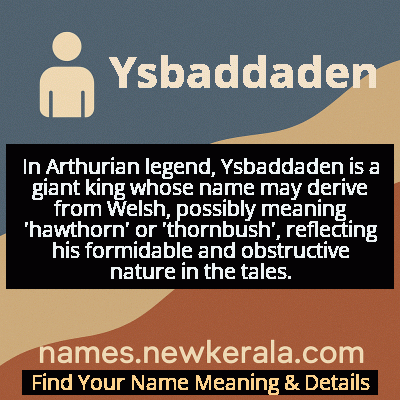Ysbaddaden Name Meaning & Details
Origin, Popularity, Numerology Analysis & Name Meaning of Ysbaddaden
Discover the origin, meaning, and cultural significance of the name YSBADDADEN. Delve into its historical roots and explore the lasting impact it has had on communities and traditions.
Name
Ysbaddaden
Gender
Male
Origin
Arthurian
Lucky Number
7
Meaning of the Name - Ysbaddaden
In Arthurian legend, Ysbaddaden is a giant king whose name may derive from Welsh, possibly meaning 'hawthorn' or 'thornbush', reflecting his formidable and obstructive nature in the tales.
Ysbaddaden - Complete Numerology Analysis
Your Numerology Number
Based on Pythagorean Numerology System
Ruling Planet
Neptune (Ketu)
Positive Nature
Intuitive, analytical, spiritual, and inquisitive.
Negative Traits
Secretive, reserved, aloof, and can be overly critical.
Lucky Colours
Green, yellow.
Lucky Days
Monday.
Lucky Stones
Cat’s eye, moonstone.
Harmony Numbers
1, 5, 6.
Best Suited Professions
Scientists, researchers, spiritual leaders, detectives.
What People Like About You
Depth of knowledge, analytical skills, spirituality.
Famous People Named Ysbaddaden
Ysbaddaden Bencawr
Mythological Giant King
Primary antagonist in Culhwch and Olwen; set impossible tasks for hero Culhwch
Ysbaddaden (Literary Archetype)
Mythological Figure
Influenced giant characters throughout Arthurian and European literature
Ysbaddaden (Cultural Symbol)
Mythological Representative
Embodied ancient Welsh concepts of chaos, wilderness, and heroic challenges
Name Variations & International Equivalents
Click on blue names to explore their detailed meanings. Gray names with will be available soon.
Cultural & Historical Significance
Extended Personality Analysis
Ysbaddaden's personality combines immense physical power with cunning intelligence and profound stubbornness. As depicted in medieval Welsh literature, he exhibits tyrannical authority mixed with a fatalistic awareness of his own destiny - he knows his death will follow his daughter Olwen's marriage, yet he resists this fate with elaborate schemes and impossible demands. His character shows strategic thinking rather than mere brute force, setting forty seemingly impossible tasks for Culhwch that require Arthur's entire court to complete. This demonstrates his understanding of heroic culture and the importance of testing worthiness through ordeal. Despite his villainous role, Ysbaddaden displays a twisted form of paternal love, seeking to protect his daughter by making her unattainable, though his methods are extreme and self-serving. His personality represents the old order's resistance to change - proud, established, and unwilling to yield to new heroes and new ways. The giant's character arc shows how even the most powerful obstacles must eventually fall to determined heroism, making him both fearsome antagonist and tragic figure bound by prophecy.
Modern Usage & Popularity
In contemporary contexts, Ysbaddaden remains almost exclusively within the realm of academic study, Arthurian enthusiast circles, and specialized fantasy literature. The name has virtually no presence as a given name in modern birth records worldwide, making it one of the rarest Arthurian names in practical usage. Its primary modern appearance is in translations of the Mabinogion, Arthurian scholarship, and occasionally in fantasy role-playing games where authentic Celtic names are sought. The name's extreme length and challenging pronunciation (approximately 'us-BATH-ad-en') limit its practical use, though it occasionally appears in historical fiction as a character name. Recent interest in Celtic mythology has brought slight increased recognition, but Ysbaddaden remains firmly in the category of mythological reference rather than viable personal name. Its usage trends show consistent but minimal presence in academic publications and Arthurian studies, with no significant changes in popularity over recent decades despite growing general interest in mythological names.
Symbolic & Spiritual Meanings
Symbolically, Ysbaddaden represents the ultimate test of worthiness and the formidable barriers that separate seekers from their goals. His character embodies the concept of the 'threshold guardian' in heroic journeys - the seemingly insurmountable obstacle that must be overcome through courage, ingenuity, and perseverance. Metaphorically, he signifies resistance to change, the entrenched power of established systems, and the wild, untamed aspects of both nature and human psychology that must be mastered for progress. His physical description - with eyelids so heavy they require propping up - symbolizes the difficulty of gaining clear vision when facing overwhelming challenges. The giant's inevitable defeat represents the universal theme that no obstacle, no matter how powerful, is truly insurmountable when faced with determined heroism and collective effort. In psychological terms, Ysbaddaden can represent internal barriers - deep-seated fears, ingrained limitations, and self-doubt that must be confronted and overcome for personal growth and achievement of life goals.

